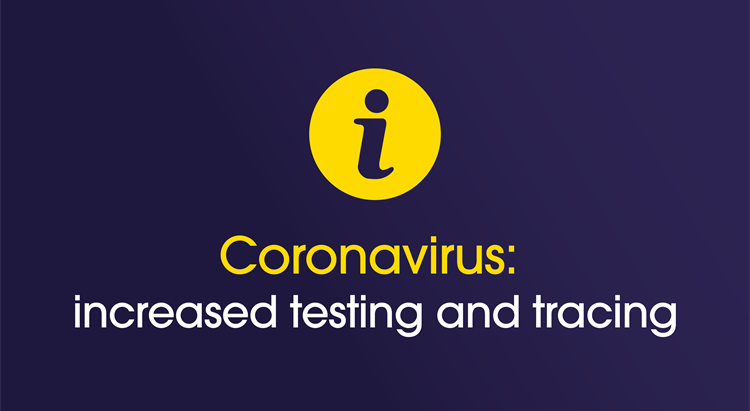22 May 2020

The Government of Jersey has set out details of its ongoing COVID-19 testing and tracing programme, designed to monitor and contain the spread of Coronavirus in the Island.
The programme is made up of the following:
- PCR (swab) testing - a diagnostic test to identify if a person currently has COVID-19, whether they are displaying symptoms or not.
- antibody (serology) testing - a finger-prick or blood test to establish whether someone has had the virus and developed antibodies.
- contact tracing – communicating with individuals who have a positive PCR result, and all who they have had contact with, to offer PCR tests where appropriate and monitor the spread of the virus.
PCR testing
PCR (Polymerase chain reaction) is a type of diagnostic testing, using a swab, which is essential to tracking the spread of Coronavirus, informing case management and suppressing transmission in our community. It is the most fundamental testing element for public safety.
Demand-led PCR testing is available for anyone with symptoms who phones the Coronavirus Helpline, to find out if they are positive for COVID-19. GPs can also provide this testing.
In addition, the Planned PCR Testing Programme is designed to identify asymptomatic frontline workers who are positive for COVID-19, but are not aware and are potentially spreading the virus. Once identified, they can isolate and contact tracing can find more positive cases. This is known as "chasing the virus".
This programme will continue to proactively test people most at risk, including frontline workers. The following initial groups have either already been contacted, or will shortly be contacted, to invite them to be PCR tested: health staff; care home staff and residents; domiciliary care agencies; ambulance staff; police and honorary police; General Practitioners; Customs and Immigration officers; pharmacy, dental and optometry staff; Prison, Fire and Rescue staff; health and safety staff; the Salvation Army; Shelter Trust; social workers; and teaching/nursery staff. The Government is prioritising those who have continued to work during lockdown.
Over the last week, more than 200 PCR tests were conducted per day as the proactive testing programme began and capacity has now increased to circa 500 tests per day. On average 100 care home residents and staff are proactively tested per day. This testing has already helped to find asymptomatic cases which would not otherwise have been identified, and this has helped to prevent the spread of infection.
PCR testing facilities have been considerably expanded, with the introduction of a double lane drive-through testing centre near the Airport, accompanied by a satellite lab facility for packaging tests, and a mobile test and packaging vehicle. This will be active from next week, allowing staff to carry out 500 tests per day.
The Government has collaborated with GPs so they can begin testing in the community.
Antibody (serology) testing
Antibody testing will give the Government insight into the likely percentage of the population who have previously been infected with COVID-19. The test looks for the presence of two different types of antibodies (IgM and IgG) which are created when a patient's immune system fights the virus.
Two types of antibody testing are available in Jersey. The first is a simple finger-prick test, using a single drop of blood and a small cartridge test. The results are ready within ten to twenty-five minutes, and this type of test is being used in our Essential Workers and Household studies.
The second is a more comprehensive blood test, with blood taken from a vein and screened on machines in the Pathology Laboratory.
While both types of test will show if a person has developed antibodies, there is no clear scientific evidence yet available to show that a positive antibody test means long term immunity.
Essential workers survey
An Essential Worker Antibody Survey will be open to all essential workers and those who worked away from home for 5 or more times during lockdown.
This programme has begun with Government of Jersey employees to stress-test the logistics. Testing began on Thursday 21 May and will be expanded to include essential workers from outside Government, including businesses and volunteers, from the start of next week.
Household survey
The Government will be holding the second round of the COVID-19 Community Antibody Testing Survey at the end of May.
1,000 randomly selected households will be contacted by letter and invited to make appointments at one of two testing sites across the island. The participants will be tested from Saturday 30 May to Tuesday 2 June inclusive.
The results are recorded into a database, so Statistics Jersey can create and publish an Island wide picture of the infection. The first round of testing indicated that there have probably been 3,300 cases of COVID-19 in Jersey.
The initial sample of 500 households has been increased to 1,000 for the second round of testing. Participants will be tested every four weeks to help estimate the spread of Coronavirus and help inform Government on how to move through the levels of Jersey's Safe Exit Framework in a careful, phased and controlled way.
Contact tracing
Contact tracing underpins the PCR testing regime and allows the Government to track and contain the progress of the virus.
The contact tracing team has been expanded to 55 staff to track and trace any positive cases through the system, and to communicate PCR test results to all individuals via a combination of phone, text and email.
While Jersey has low infection rates, there is no immediate plan to launch a contact tracing app. However, a digital contact tracing app is expected to support the eventual opening of borders and the Island's exit from lockdown. These issues are subject to ongoing discussion by Ministers.
Together with Digital Jersey, the Government is working closely with UK and Irish development teams and leadership to follow their progress, and to evaluate options for a local app which meets the needs of residents and travellers to and from the Island.